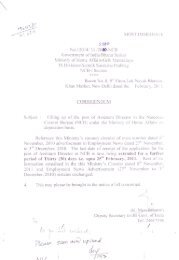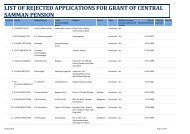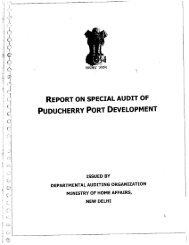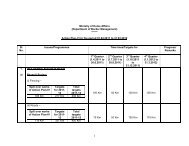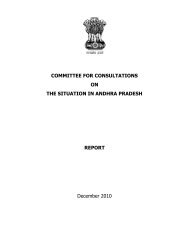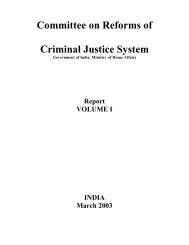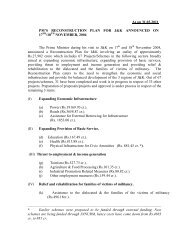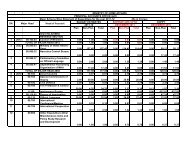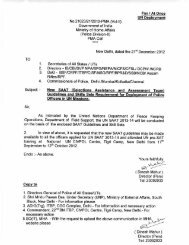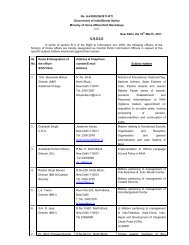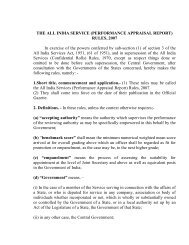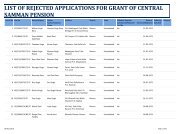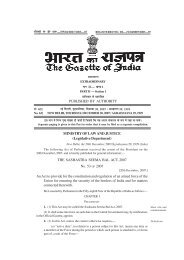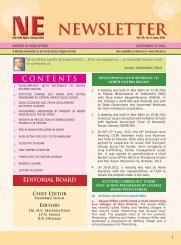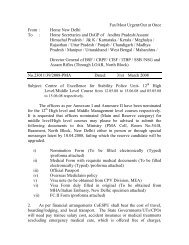Book of Integration Council New - Ministry of Home Affairs
Book of Integration Council New - Ministry of Home Affairs
Book of Integration Council New - Ministry of Home Affairs
You also want an ePaper? Increase the reach of your titles
YUMPU automatically turns print PDFs into web optimized ePapers that Google loves.
we can take pride that the country has recorded impressive figures in terms<br />
<strong>of</strong> growth rate, our village and cities still grapple with basic problems like<br />
non-availability <strong>of</strong> clean drinking water and absence <strong>of</strong> basic amenities like<br />
sewerage. Large segments <strong>of</strong> our population do not have the assured two<br />
square meals a day, leave aside access to even basic levels <strong>of</strong> health care,<br />
education and housing fit for human habitation. The gap between the rich<br />
and the poor continues to widen. Nearly 77 percent <strong>of</strong> our people still<br />
survive on less than Rs.20 per day. This shows that we have failed to realize<br />
the goal <strong>of</strong> equitable<br />
development.<br />
One <strong>of</strong> the reasons for this inequitable pattern <strong>of</strong> development is the<br />
wrong approach adopted in central policies. For example, agricultural policies<br />
<strong>of</strong> the centre are made without any regard to the unique requirements <strong>of</strong><br />
different regions in the country. Although agriculture is a state subject, the<br />
centre controls the critical area <strong>of</strong> price fixation <strong>of</strong> both the farm inputs and<br />
the agricultural produce. But while the costs <strong>of</strong> inputs have sky-rocketed, there<br />
has been no corresponding increase in the MSP <strong>of</strong> critical food-grain and<br />
other agricultural produce.<br />
The increase in cost <strong>of</strong> cultivation has led to the decrease in net-pr<strong>of</strong>it. This<br />
has seriously affected the social fabric in the country, especially in Punjab. This<br />
was one <strong>of</strong> the main reasons behind the decade-long violence that afflicted<br />
Punjab. These conditions can also lead to the rise <strong>of</strong> ideological violence as<br />
witnessed in several parts <strong>of</strong> the country. The disturbing news from the farm<br />
sectors is that 40% <strong>of</strong> the agriculture population <strong>of</strong> Punjab has become surplus<br />
and needs to be shifted away to alternative jobs in other sectors such as industry,<br />
service etc. Failure to do so will add to the already mounting number <strong>of</strong> the<br />
unemployed and this in turn will pose a serious threat to peace. Economic<br />
deprivation leads to frustration among the people and this frustration is exploited by<br />
mischievous elements to create conditions <strong>of</strong> unrest in society, leading to serious<br />
threats to peace. Poverty and unequal distribution <strong>of</strong> wealth thus become major<br />
challenges to peace and national integration.<br />
I also wish to state here that the subsidies being given by the Punjab government<br />
to the farm sector should be treated as national investment for growth incentives.<br />
While I strongly advocate such subsidies, I also urge the centre to come forward<br />
and share the burden <strong>of</strong> the state goverment because these subsidies serve the<br />
objective <strong>of</strong> food security, which is realy a national issue.<br />
170



